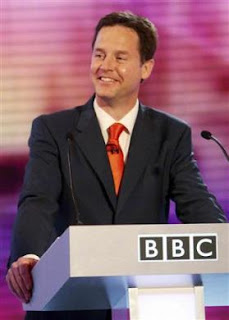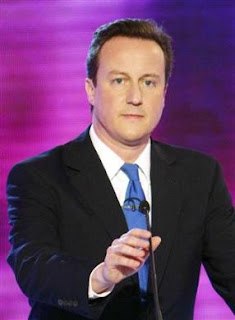Last night saw the 3rd and final debate in the run-up to the British polls last night between the top 3 party’s leaders, Nick Clegg for the Liberal Democrats, David Cameron of the Conservative Party and embattled incumbent, Gordon Brown for Labour. The general topic was the economy and much to my surprise I have to say I found it to be a rather entertaining and stimulating exchange.
I really had no idea what to expect when the debate started, sure I had read the articles on the first two debates which generally had found Clegg to have bested Brown and Cameron in this form of electioneering thus accounting for the reported upswing in Lib-Dem’s in recent polls. The only knowledge and experience I’d had regarding debates was (as most people have) the American model. Whilst this generally followed the ‘town-hall debate’ format of American debates, with questions being taken from the audience, where the British departed from their American counterparts was in the manner in which questions were answered. Whilst in the American debates this format is generally marked with seemingly disingenuous, ‘I feel your pain,’ plaintive answers lightly skirting over the actual issues, at least two of the debaters, Brown & Cameron took the opportunity to actually go into the nuts and bolts of their respective policies. Clegg, however, was patently out of sorts, displaying his and his party’s naivety and unpreparedness to govern.
The looming spectre of “BigotGate,” which had occurred just the day before, was, I will admit, one of the main reasons I chose to watch after ignoring the first two debates. However, any expectations for a full on attack by either Clegg or Cameron were thwarted with Clegg and Cameron choosing to take the higher ground on what essentially was a non-issue. In fact, the only blatant reference to the gaffe came from Brown himself who in his opening statement said, “There’s a lot to this job (the Prime Ministership) and as you saw yesterday I don’t get all of it right,” which I felt brought a sense of much-needed finality to the issue in an appropriately apologetic tone before swiftly moving along.
 Nick Clegg, whilst he in my opinion failed in the debate, the one message which he was able to successfully put across, was how the blame for the muck and mire that the United Kingdom found itself in today could be squarely placed at the feet of both Labour & Tory, and as far as I saw, there was no response to that claim from either Cameron or Brown. Despite the fact that his main message was put across successfully, Clegg took quite a battering from both Cameron & Brown who took this opportunity to show the Lib Dem manifesto for what it is, a collection of unfeasible idealism. He was particularly hammered on Lib Dems’ call for an amnesty for illegal immigrants that had been in
Nick Clegg, whilst he in my opinion failed in the debate, the one message which he was able to successfully put across, was how the blame for the muck and mire that the United Kingdom found itself in today could be squarely placed at the feet of both Labour & Tory, and as far as I saw, there was no response to that claim from either Cameron or Brown. Despite the fact that his main message was put across successfully, Clegg took quite a battering from both Cameron & Brown who took this opportunity to show the Lib Dem manifesto for what it is, a collection of unfeasible idealism. He was particularly hammered on Lib Dems’ call for an amnesty for illegal immigrants that had been in
 Cameron was the one candidate I was probably most interested to hear. Reason being, of the three candidates and parties, his was the one I had paid the least attention to. My reasoning for not bothering to listen or read up on the Tory manifesto was supported right from the moment he answered his first question. Despite all the promises of a ‘new Conservative Party,’ he espoused the exact same liberal-economic policies that Conservatives in the
Cameron was the one candidate I was probably most interested to hear. Reason being, of the three candidates and parties, his was the one I had paid the least attention to. My reasoning for not bothering to listen or read up on the Tory manifesto was supported right from the moment he answered his first question. Despite all the promises of a ‘new Conservative Party,’ he espoused the exact same liberal-economic policies that Conservatives in the
 Gordon Brown explained his party’s policies extremely well, being able to respond to the critiques and attacks of Cameron & Clegg. However, this is where the problem with Brown comes in. Unlike Cameron & Clegg, who were very good at their delivery and thus had a number of easily remembered moments with Brown, there are no such moments. There are only two quasi-exceptions to this. His opening statement which is only memorable as being the only mention of BigotGate and when I felt he scored points not through anything he said, but because he stood back and allowed Cameron & Clegg to bicker between themselves when they were answering the immigration question.
Gordon Brown explained his party’s policies extremely well, being able to respond to the critiques and attacks of Cameron & Clegg. However, this is where the problem with Brown comes in. Unlike Cameron & Clegg, who were very good at their delivery and thus had a number of easily remembered moments with Brown, there are no such moments. There are only two quasi-exceptions to this. His opening statement which is only memorable as being the only mention of BigotGate and when I felt he scored points not through anything he said, but because he stood back and allowed Cameron & Clegg to bicker between themselves when they were answering the immigration question.
Ultimately, I am a believer in substance over form and that is why I felt that this debate went to Brown, followed by Cameron then Clegg trailing a very distant third. However, the main poll that was being circulated both on television and on Twitter after the debate, YouGov’s poll, gave the win to Cameron by 41%, followed by Clegg with 32% and Brown trailing far behind with 25%. What to make of these numbers, I truly don’t know. What to expect on election-day, again I don’t know.
However, many seem to be returning to the belief that we can expect Cameron to be Prime Minister either through aligning with Lib-Dem as Brown charged or one or some of the smaller fringe parties. My take on this possible scenario is this. Clegg is an idealist, but at the end of the day he is a liberal idealist and though he may now eschew Labour for ‘betraying’ liberal ideals as one analysis prior to the debate argued, I cannot see, how the Lib-Dems would be able to explain to their electorate, that they chose to align with the ultimate enemy, Conservative A scenario I could see playing it is a Clegg Prime-Ministership. What would occur is Brown would resign after Labour placed 3rd position in the election and the Labour leadership would go to Clegg proposing a Lib-Dem led coalition. This would scupper any chances of a Conservative led coalition government (made up of the smaller parties). Lib Dems if they failed to do this, would ultimately have to answer to their extremely liberal base as to why they failed to stop a Conservative government.
Ultimately though, I don’t have a crystal ball to look into because despite what the analysts say, having a politics degree doesn’t mean you can tell what’s going to happen. The only thing I can say for a certainty is this. Keep your eyes glued to the
You could have simply posted those 3 pictures. They convey your opinion perfectly - Justin
ReplyDelete